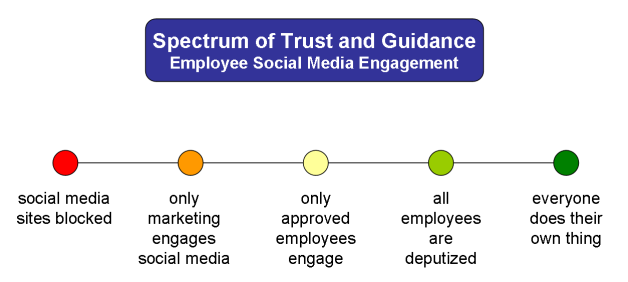December 15, 2008
by Hutch Carpenter
For the longest time, social media enthusiasts have noted that employees represent their companies, whether they realize it or not. This becomes more apparent every day as more people take part in the Grand Conversation.
Two tech behemoths have in recent weeks released their social media guidelines for employees. I’ll describe them a bit below, but I think it’s worth noting what milestones there are. Historically, large companies haven’t really encouraged employees to talk out in the market. But then, historically all you had were newspapers and trade magazines.
Companies have had to figure out how to handle social media. Some are advancing well, others are stuck in the 1990s. Here’s a spectrum of ways companies can handle employees and social media:

Social media sites blocked: This is an ongoing issue. More companies appear to be enlightened, but there’s still a persistent, old school strain that blocks them. Hard for your employees to engage in social media if they can’t get to the sites.
Only marketing engages social media: Also known as the YouTube Strategy. Social media is a thing that you use to go viral. Other employees may be out there, but they probably need to keep their company identity a secret.
Only approved employees engage: This is actually a company warming up to social media. It knows there is more than the YouTube Strategy. It wants employees to participate.
EMC found some good natural blogging talent internally that it promoted to be EMC’s external voices. And that has paid off well in terms of market engagement. [See update in the paragraph below – EMC is actually deputizing its employees as well.]
All employees are deputized: This is what IBM and Intel are doing. They are treating every employee as an individual brand manager out on the Web. They are deputizing them by giving them guidelines, setting expectations, and then letting them act on their own. It’s a wonderful way to let employees both (1) engage the market about their company and their work; and (2) learn from others as to the state of their fields.
UPDATE: Per the comments below, EMC is actually another proponent of deputizing all employees.
Everyone does their own thing: Not having any type of policy is the policy. This is the default position. And companies still benefit tremendously here. They just may have some employee behaviors they wouldn’t want to see.
Oddly enough, I’d say most companies are on either extreme. They either block social media, or have no policy. But IBM and Intel are pointing to a new thinking about how companies and their employees are engaging social media.
A Look at IBM and Intel’s Guidelines
IBM released its social media guidelines several weeks ago. Intel’s came out last week. Both do a great job of mixing corporate interests with a hands-off approach that defines authentic social media engagement. The documents are pretty good reads, and surprisingly similar. Looks like Intel was a good student of IBM’s guidelines.
I’ve pulled together highlights from each companies’ guidelines below:

Lots of respect to IBM and Intel for their guidelines. These companies are trendsetters, and I look forward to other companies joining the fray.
*****
See this post on FriendFeed: http://friendfeed.com/search?q=%22Early%3A+Companies+Deputizing+Their+Employees+as+Brand+Managers%22&who=everyone


The Conversation